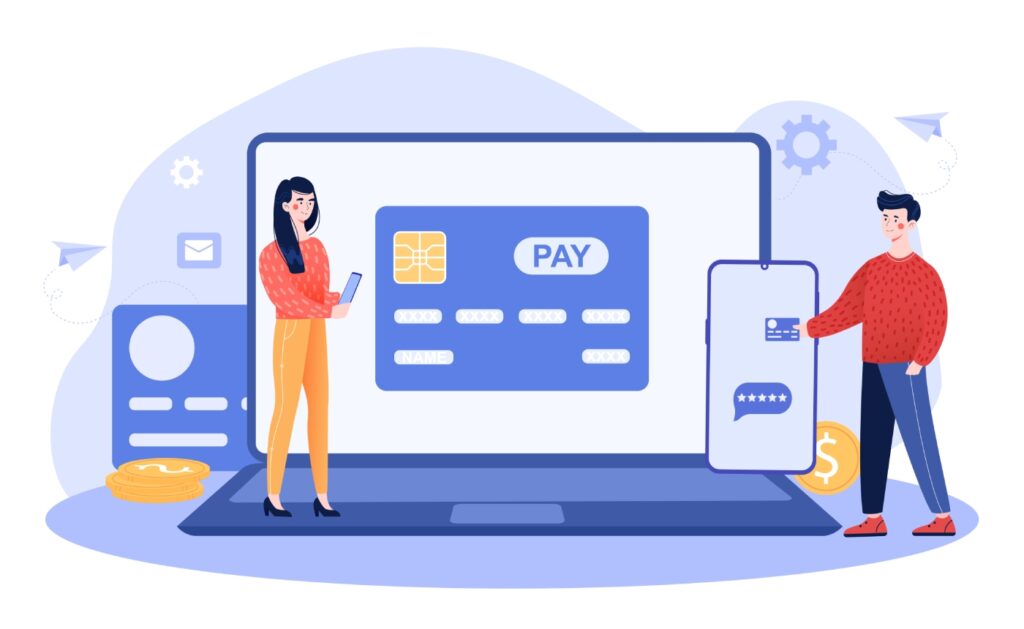Key takeaways
POS is an acronym that stands for Point-of-Sale system. In short, a POS is a device/software/terminal configuration that facilitates the acceptance and processing of sales transactions, multiple forms of payment (credit cards, debit cards, digital payments, etc), and the calculation and collection of applicable sales taxes.
Today’s POS system is not your grandfather’s cash register; modern POS systems have evolved into something entirely different. Your POS system is your business’s heart and pumps every enterprise’s cash flow.
Read more: How to use a POS System
What are the different types of POS systems?
Whether it’s a self-service kiosk, online POS system, terminal POS system, tablet-based POS system, mobile POS system, multi-channel, or open-source POS system, there are a multitude of POS systems to choose from that can be tailored to your unique needs, budget, and customer base. In short, the right POS system type and approach will best suit your individualized needs and demands.
Following are some of the most common POS types found in small businesses today.
Self-service POS kiosks
These point-of-sale systems are designed to provide convenience and speed for the customer, reduce labor costs, and free employees to perform other functions. These are most popular and used at many fast-food or casual dining restaurants and other self-service businesses–gas stations, bank ATMS, hotels, hospital check-ins, retailers, etc.
The obvious pros of using self-service kiosks are reductions in labor, expediting of the transaction and ordering process, preventing bottlenecks in placing orders or making purchases, reducing labor overhead and other associated costs (health insurance, worker’s comp costs), 24-7 operation, increased customer satisfaction, a reduction in order or communication errors, a reduction in paper receipts and ink costs, and the elimination of duplicate methods of order taking (orders are sent digitally to kitchen, counter, or waitstaff). It’s also an opportunity to market and upsell a customer quickly and non-intrusively.
The cons are few, but some customers still prefer someone to wait on them and enjoy human interactions or are intimidated by ordering via machines.
This option is growing in popularity and is used by numerous enterprises, but it is still one of seven different POS systems that may be the best fit for your business.
Mobile Point of Sales systems
As the name implies, these POS systems work via smartphones. Typically, the POS provider provides the merchant with a simple small scanner that plugs into the merchant’s smartphone or tablet, and the software to run the POS solution is typically free. The POS solution provider also normally charges a percentage of each solution.
EXPERT TIP: This solution is perfect for users who need to be mobile and untethered to a terminal or storefront. Mobile POS is also an excellent solution for food or street vendors, festivals, events, merchandise sales, concerts, lawn care companies, landscapers, freelancers, artists, etc.
The pros to these systems are they typically don’t require contracts, POS hardware (just a tiny card reader), or tethered terminals. While these POS providers take a small percentage of sales, they don’t have any recurring fees or long-term agreements.
Read more: 24 Key POS Features You Need In 2024
Tablet POS systems
Like mobile point of sales solutions and tablet POS systems that work with iPads (IOS) and Android-type tablets, like mobile POS solutions, they are portable or can also be used at a fixed retail location but allow more flexibility and mobility. Some POS types of systems charge a monthly or recurring fee, and others provide free software but charge a processing fee.
This may be an excellent solution for retailers, merchants, food and beverage vendors, small restaurants, coffee houses, cafes, juice bars, and other small retailers, hair salons, or commercial retailers.
Pros of the tablet POS option include mobility and the ability to add more hardware or peripherals, including barcode scanners, receipt printers, cash drawers, and static table stands. You can also perform inventory control and timecard tracking tasks.
Also read: POS Data Guide for POS Analytics
Online POS sale solutions
This is an easy-to-use and low-cost POS solution or option because you can use existing hardware, tablets, laptops, or desktop computers to process your transactions, including high-ticket transactions. This may be the perfect solution for any merchant that doesn’t do high-volume, high-frequency sales; plus, just like mobile and tablet POS solutions, you can log in anywhere where you can access the internet or Wi-Fi.
This may be a great option if you’re a small retailer, salon, art gallery, consignment store, antique store, etc.
Multichannel POS systems
A multichannel POS system is a scalable point-of-sales system that integrates and manages sales across multiple sales channels within an enterprise. The most significant advantage of this POS type is the ability to consolidate all transactions, inventory management (reflecting real-time updates to stock levels), order management, and unified enterprises with an omnichannel sales approach—retail mortar sales, pickup, delivery, e-commerce, etc.
Open-source POS systems
First, let’s establish what the term open source means; this term refers to software or projects that use a source code that’s widely and freely available to everyone and for viewing, enhancement, modification, and even distribution. This kind of POS option allows individuals, communities, and organizations to easily collaborate, improve, modify, and build upon the original framework.
What are the potential drawbacks of Open-source POS systems?
- Because the software is open source, there’s typically little support. You must rely on the “community” and others to trouble shoot issues.
- It requires technical expertise and skills to configure, maintain, and troubleshoot. If you run into issues, there’s no conventional customer support, and you may need to outsource this task or hire your own team or individual. This can add to labor costs and overhead, plus make you dependent on “experts.”
- Integration challenges. It will not seamlessly integrate with other proprietary solutions.
- Security concerns. As with proprietary (paid) software, open-source POS software can also face vulnerabilities. You must actively monitor security breaches and updates and apply patches promptly.
- Lack of built-in features. You will have to develop everything that you need, thus incurring potential additional costs and labor needs.
If you have the technical knowledge and experts on staff and demand the most open-source POS option, this might be the perfect solution for your business, but there will be better fits for most companies.
Terminal POS systems
A Terminal POS is a traditional type of POS for retailers. This is still a popular and relatively prevalent configuration or POS solution that has a hardware device (typically fixed) and is the physical “interface” for transactions between a merchant and a customer. Terminal POS systems integrate well with other business software, including accounting, inventory, CRM, and data management. These types of POS systems generate printed receipts, including sale details.
Most Terminal POS systems use hardware/terminal (touchscreen), keypads, software, card readers, inventory management, receipt generation, and other peripherals or hardware.
This is a great POS system for retailers and larger enterprises that are typically more “tethered” to a physical location with checkout lanes, etc.
Read more: Best POS for Customer Rewards
The future of POS solutions
We don’t claim to have a crystal ball, especially when it comes to predicting the future of POS, but a few trends or indicators are clear:
The adoption of Tablet and Mobile POS systems will accelerate due to increased market penetration, consumer demands and behavior, reductions in price, more flexibility, and the anywhere-anytime qualities of these two solutions.
How do you select the right POS for your business?
If you’ve read this far, thank you. As you may already be able to see, there are many options out there, and there are a lot of considerations to make when selecting a POS system solution for your business or enterprise.
We hope our quick analyses and brief overviews point you in the right direction, eliminate specific unsuitable POS systems or approaches, and find the perfect POS solution that meets all your demands, future needs, and budget.
Check out our Retail Point-of-Sale Buyer’s Guide to help you along your journey.





